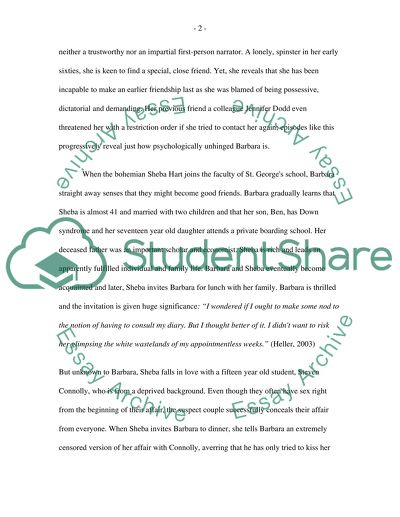Cite this document
(“COMPARE AND CONTRAST THE DEPICTION AND SIGNIFICANCE OF AGE IN THE Essay”, n.d.)
COMPARE AND CONTRAST THE DEPICTION AND SIGNIFICANCE OF AGE IN THE Essay. Retrieved from https://studentshare.org/miscellaneous/1554028-compare-and-contrast-the-depiction-and-significance-of-age-in-the-following-novels-no-country-for-old-men-and-notes-on-a-scandal
COMPARE AND CONTRAST THE DEPICTION AND SIGNIFICANCE OF AGE IN THE Essay. Retrieved from https://studentshare.org/miscellaneous/1554028-compare-and-contrast-the-depiction-and-significance-of-age-in-the-following-novels-no-country-for-old-men-and-notes-on-a-scandal
(COMPARE AND CONTRAST THE DEPICTION AND SIGNIFICANCE OF AGE IN THE Essay)
COMPARE AND CONTRAST THE DEPICTION AND SIGNIFICANCE OF AGE IN THE Essay. https://studentshare.org/miscellaneous/1554028-compare-and-contrast-the-depiction-and-significance-of-age-in-the-following-novels-no-country-for-old-men-and-notes-on-a-scandal.
COMPARE AND CONTRAST THE DEPICTION AND SIGNIFICANCE OF AGE IN THE Essay. https://studentshare.org/miscellaneous/1554028-compare-and-contrast-the-depiction-and-significance-of-age-in-the-following-novels-no-country-for-old-men-and-notes-on-a-scandal.
“COMPARE AND CONTRAST THE DEPICTION AND SIGNIFICANCE OF AGE IN THE Essay”, n.d. https://studentshare.org/miscellaneous/1554028-compare-and-contrast-the-depiction-and-significance-of-age-in-the-following-novels-no-country-for-old-men-and-notes-on-a-scandal.


